Early last summer, in a fit of a desperation, I read the first few of Shakespeare’s Sonnets to get my kids (then 5 and 3) calmed down for bed. Tonight we just finished our second run through and began our third.
I’m not ready for her to be a beautiful toddler. But she runs ahead to her future anyway.

📷: the inestimable Mrs. Perez
Sometimes you have to start your coffee day with an espresso and then move on to a pour over. Today is one of those days.
One year!

Back at it for another season ⚽️
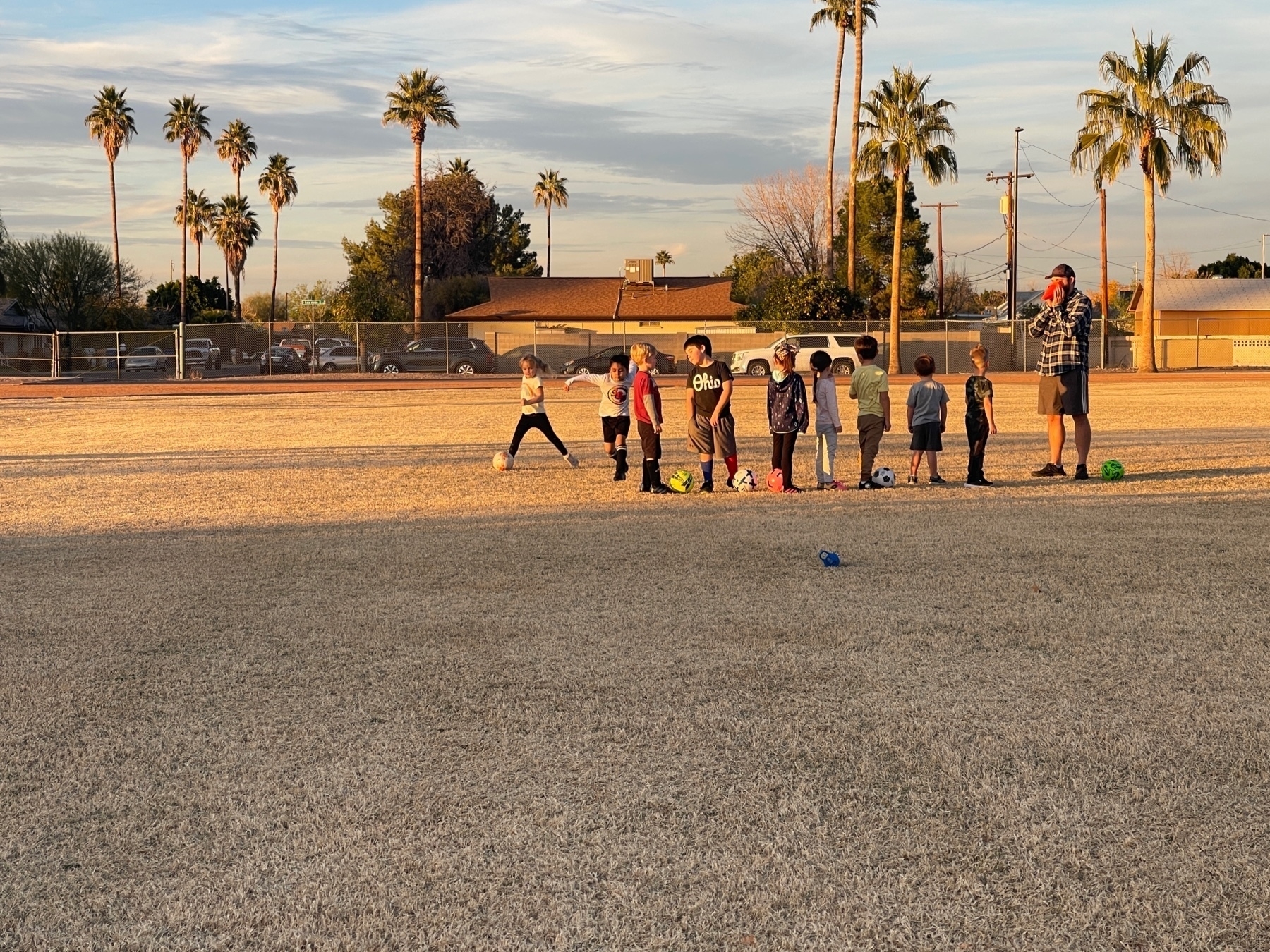
First practice for the kiddos today.
Dad life. Baby girl (1yo on Friday), screaming bloody murder for mom, and then at hand off, stops, takes a big sigh, and just relaxes with her head in arms. ❤️
In a first for student emails. The entire email—greeting, body, salutation—is in the subject line.
How to course prep for the first day of class tomorrow when your wife is recovering from Covid, and it is also her birthday:
- You don’t.
- There is no step two.
As a general rule, real estate agents randomly texting folks at 9:30pm on a weekend asking if his house is for sale is not an effective strategy of cold calling potential leads.
What's in my RSS right now
Earlier in the week, I posted on what apps and subscriptions I have currently, going into 2022. I thought it was helpful to clarify for myself where my financial commitments were going. Even free apps will use data—either data that I pay for, or data that I create in using it—or my time, both of which have financial implications. I thought, therefore, it might also be helpful for me to sketch out what I am consuming in RSS right now. As I said before, nearly everything is inside Net News Wire, an original RSS reader for the Mac with a protracted, yet storied provenance.
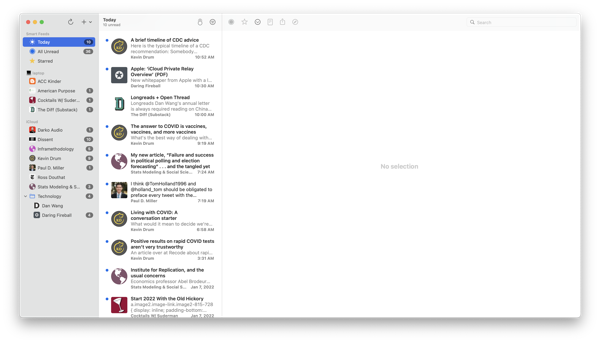
In addition to reading both the NYT and WSJ most weekday mornings, a common theme you’ll find here a heterogeneous and eclectic mix of political writers and websites, from social-democrats, to libertarians, to constitutional-conservatives. Much of these readings patterns are functions of my day job, but also of adding, dropping, and re-adding websites and writers who continually show up in places I respect. My goal is to have a broad mix in my morning reads. Basically, if I don’t finish the queue on any given day, it all gets marked as read and I don’t worry about what I missed.
On my Laptop
- ACC Kinder. The class blog for my son’s kindergarten class. Infrequent updates, but I like to have the RSS here so I don’t miss anything.
- American Purpose. Long-form essay on classical, constitutional, liberalism. This is a great website of liberal and conservative thought “of the old religion” (i.e., neither woke-progressivism, nor populist-nationalism).
- Cocktails With Suderman. Peter Suderman is a journalist for Reason who started a stubstack in late-2020 on home bartending. It’s great. I can’t afford to being a paid subscriber, but I’ve learned a lot. (Don’t sleep on Rittenhouse, folks!)
- The Diff. A Substack on finance and technology. It’s a recent subscription, and I don’t have a settled opinion.
Synced to iCloud
- Darko Audio. John Darko has the best music first audiophile website you can find. He also has a great YouTube channel. I don’t read Stereophile or Absolute Sound anymore, not because I don’t like reviews of $100k audio equipment the editors think is “modestly priced.” (I actually like that attitude sometimes.) Rather, they are part of an older business model where so much is pay-walled, the ads aren’t good, and writers have a lot of contempt for contemporary music. I don’t have time for that in my daily news reading.
- Dissent. Arguably among the the best intellectual centers of gravity for the democratic left.
- Inframethodology. It’s a writing blog for social science, but really, so much more. If you write for a living, or if writing is important—read this blog.
- Kevin Drum. formerly of The Washington Post and Mother Jones. Drum writes on public policy and is an old school blogger (since 2002, IIRC).
- Paul D. Miller. A personal friend’s Twitter feed. I’m going to think carefully about who I want to subscribe to on Twitter, but I suspect by year’s end, I’ll have a folder of roughly a dozen folks I take seriously enough to read in NNW.
- Ross Douthat. Conservative columnist for The New York Times. IDK if it’s possible to get this feed without the paywall, but since I get the Times from my university, I’ve never bothered to check.
- Stats Modeling & Social Science. Look—this is an inside baseball website. But even for those who aren’t professional social scientists, you can learn a lot if you suck up and read it regularly. I still don’t always get what’s going on, but I’ve learned more than I can mention from this site.
- Dan Wang. Currently with Bloomberg, Dan’s been a technology writer focusing on Asia for a long time.
- Daring Fireball. Mac/Apple Blogger. John was one of the first bloggers I subscribed to in college.
What’s getting dropped, or has been dropped
- Analog Planet. Michael Fremer is a rare exception to my aforementioned misgivings about many of the writers of legacy audiophile magazines. But I don’t have a turntable anymore. If I could get a feed of just his music reviews, I’d subscribe in a heartbeat. He’ll be in a folder for the occasional perusal.
- Remodellista. I’m a sucker for good design and this is a terrific website for reading about how good design in your home works. (Do check out their book.) But the website never loads the full page inside RSS and they recently announced a subscription model. I don’t blame for doing so. But the cost/benefit doesn’t work for me right now. If you’re thinking about starting a remodeling project, strongly recommended.
- The Omni Show. I’m sucker for Omnifocus and Omnioutliner. The show is great for nerds like me. But again, it is not, strictly speaking, an essential.
- Real Clear Defense. An off-shoot of the venerable Real Clear Politics, RCD focuses on national security news. It’s so good, I include it on my syllabi for students. But the RSS is a kind of a mess. I’m sure someone who know UI/UX better than I call explain why, but this site just works better on the webpage. You can see the links, the author, and the site where it appears. It makes it much easier to scan for important things.
- The Pull Request. Antonio Garcia Martinez' Substack. Good. But I culled anyway to see if I miss reading his work.
That’s it. I wonder how this list will shape up through the year. I know it’s changed a lot since last year, and I regret not writing down where my news consumption was back then.
🎥 Streaming Music Sucks. It’s supposed to be parody, but—and hear me out—he’s not entirely wrong.
A year ago was a rough day for Americans. I wrote this shortly after, and I’d like to think it holds up.
My wife tested positive yesterday, after onset of mild-moderate symptoms. (None for me, not even a sniffle.) So I’ve been nurse and dad for the 4 littles ones all day. Not a problem. But… the internet has been down since this morning.
🗞 The Performative Demonstration of Education, via @benwerd.
Ultimately, we don’t care so much about actually educating people. We care about showing that we have educated people.
My view from academe: more true than most of you realize.
🗞 Your Attention Didn’t Collapse, It Was Stolen
Brutal. See also, Deep Work
“3b. If you don’t “get” a classic movie with good pedigree, 3/4 of the time the fault is yours.”
Home screen & subscriptions in 2022
I meant to post this on the first, but then forgot. Thankfully, other microbloggers posted their iterations of this genre.
- @maique Subscriptions
- @podique 2022: my subscriptions
- @gabz Subs game
Here’s my iPhone setup.
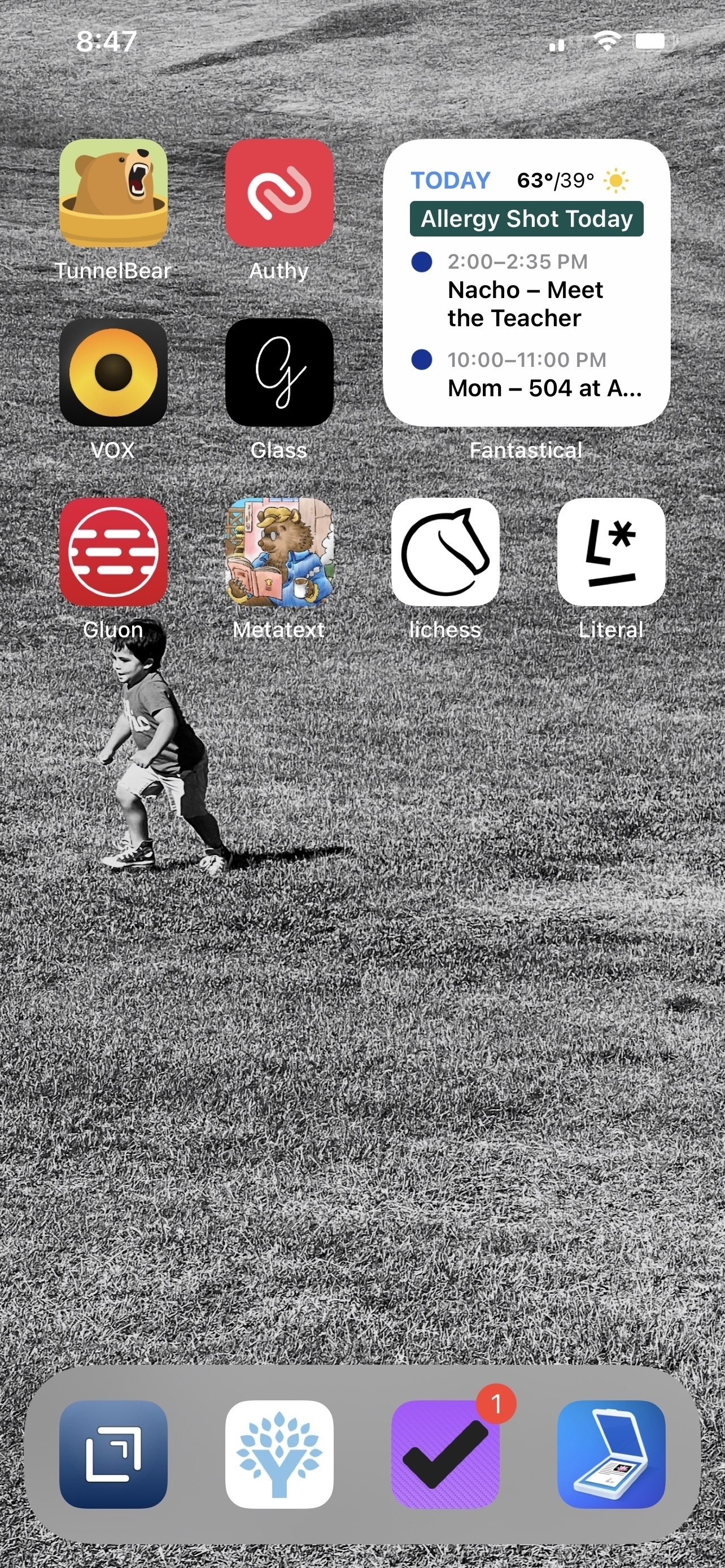
I only have one home screen. Merlin Mann convinced me on a podcast years ago to keep at least on row empty. I think he was talking about committments, but he said something to the effect that if we’re always operating at 80 or 90 percent, we won’t have anything left when the opportunity of a lifetime arrives. When Apple made it possible to keep the bottom row empty, I did it immediately. I suppose you could call it minimalism, but I learned the lesson elsewhere, from stoicism. (That’s what I get for double majoring in Ancient Greek and Latin. )
- Fantastical runs as a widget so I can see the days events. I use Busycal on my Mac, like a barbarian. Don’t @ me.
- Tunnelbear is my VPN. I got a discount on a multi-year plan a while ago and so I’m sticking with it until it expires—and then, who knows. I’ll stay or switch depending on what the market looks like when that happens. But if you’re not using a VPN on public wifi, you should really start.
- Authy manages all my 2-factor identification with the exception of my university which uses Duo. Thus far, I have not found a way to get my university’s 2FA to run inside Authy. But I keep looking.
- Vox will play FLAC files on your iPhone. When reviewing my 2021 practices, I was disappointed that I didn’t listen to as much music as I used to. So I unsubscribed from all but three podcasts, moved Overcast to the app library and recommitted. I can talk audiophile gear all day, but suffice it to say, this is overkill for the casual listener.
- Glass is here because once I decided to delete Instagram, I wanted to commit to this before I decided if I want to keep it or not. I’m unsure if this will last for the year.
- Gluon is a wonderful Microblog client and I love it.
- Metatext runs Mastodon. Mastodon is weird, and I think I should quit it. But I’m sticking it out, for now, until I decide if it is worth it.
- Lichess is a free chess club. I’m not very good, but I still love to play. Chess is honestly the only digital gaming I do.
- Literal is another service that I’m unsure about. I like it’s layout better than Goodreads, but at times I wish it was more like Goodreads. Like Mastodon and Glass, I can’t form a bigger opinion until I give it more time.
In the dock is Drafts, YNAB, Omifocus, and Scanner Pro, These are the critical and crucial for my day-to-day. Nearly everything I write starts in Drafts. I send links there from Twitter or the web and tag them with what I want to do with them (email, Omnifocus, Microblog); I, er, draft, emails, manuscripts, and reading notes before processing them periodically through the week. YNAB is a budget and expense tracker that my wife and I use; while I’m aware of the kerfluffle over the price increase, I’m not bothered by it because there’s nothing else comparable right now. I’ve been an Omnifocus user for a very long time; you couldn’t pay me to leave them. I’m sure I could find a better app than Scanner Pro, but it’s very useful when I work on a white board while teaching or in my office and need a PDF of it before I erase. I occasionally scan other documents, but most of the tme it’s just this uni-purpose and good enough that I want fast access.
My iPad home screen is a hot mess.
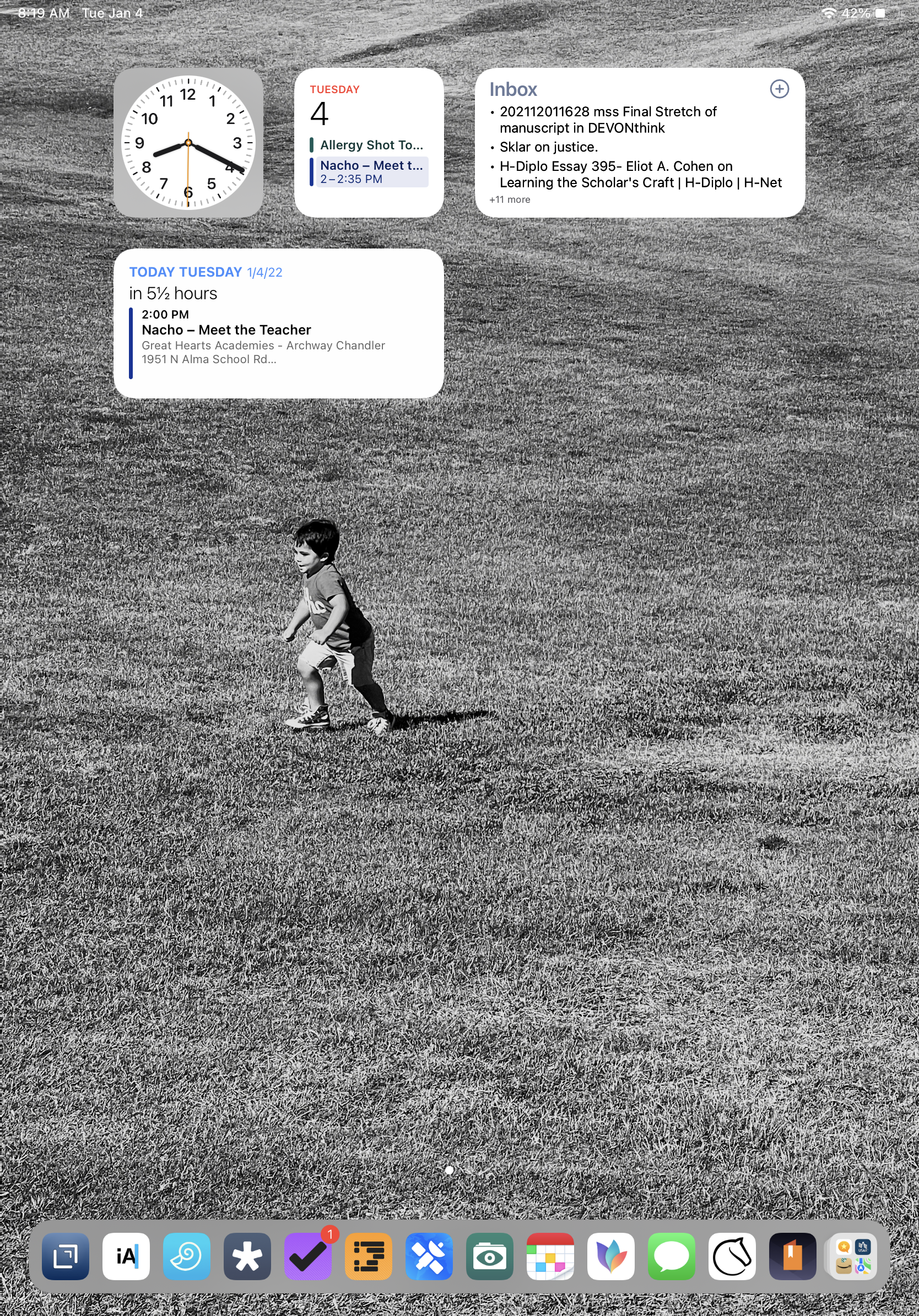
A lot of similar items like Drats and Omnifocus. I have two text editors worth noting, Editorial and iA Writer. Both are good when I need something different than Drafts. iA is great for prose and has more or less replaced Editorial. YMMV. I need to consolidate the various files from both and make space for a dedicated code editor like Textastic so that I can work on R scripts when I’m away from my laptop but still want to get some writing done.
Here, it’s all in the dock and the widgets are helpful. But note that I have two calendar widgets. It’s just an experiment to see which format makes the most sense for my uses. I expect my iPad setup to look a lot different at the end of the year.
What else am I subscribed to?
- Disney+ – Nope. I don’t have a Netflix.
- Fastmail – I’m a convert. It’s great.
- Hover – best domain name service I’ve used.
- Wall Street Journal – free from my university
- New York Times – also free from my university
📻 Dawn Chorus high in the French Pyrenees
You’re welcome.
Anno Domini MMXXII
Yesterday was a lovely, restful start to the new year. Since the kids we’re up late to watch the ball drop in in New York, they slept in. We didn’t leave the house until nearly noon.
The boys insisted they had to take me to the “air plane park,” a small playground near the municipal airport. The playground has plane themes everywhere including a windsock at the top of the structure.

My wife and I rarely have time for us to both go with them to the park. Usually one of us takes them while the other stays home to clean or work on other things. But when we both go, the kids love that they can spread out a little, knowing one of us nearby to serve as a dutiful audience to their fun.

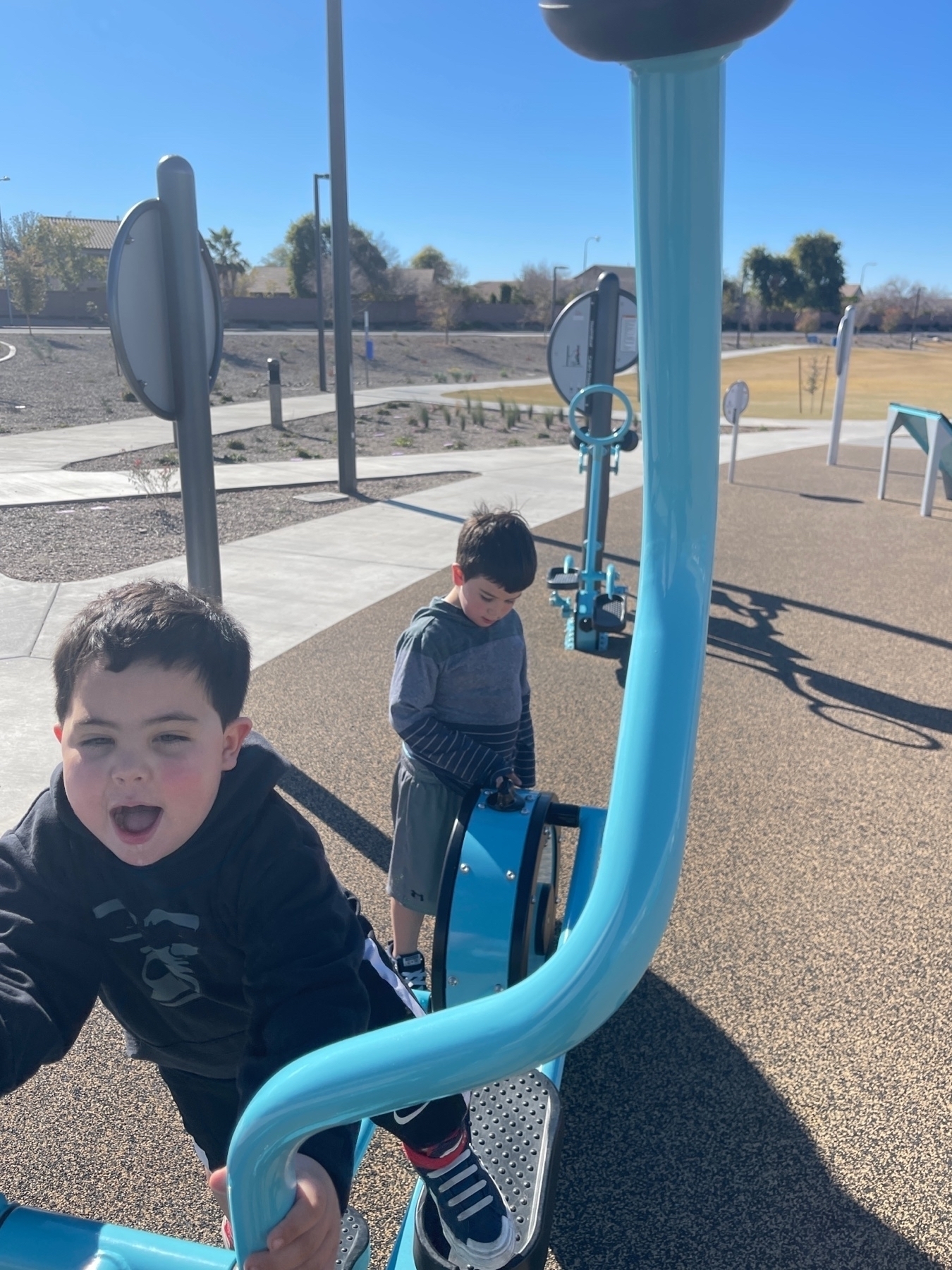
After the park we ran to get some groceries and were home in time to watch the Rose Bowl. I love college sports. And indeed almost never watch professional teams. (A story for another day.) So, I would have watched regardless, but both my wife and I went to The Ohio State for college.
I mentioned a month ago when Ohio State lost to Michigan that the silver lining was that we would end up playing in Rose Bowl with a solid chance to win, and end the season on a high note, as opposed to getting punched in the face by Georgia.
Needless to say, I was not wrong. Easily among the best Rose Bowls of the last ten years. But the ending, was sublime.
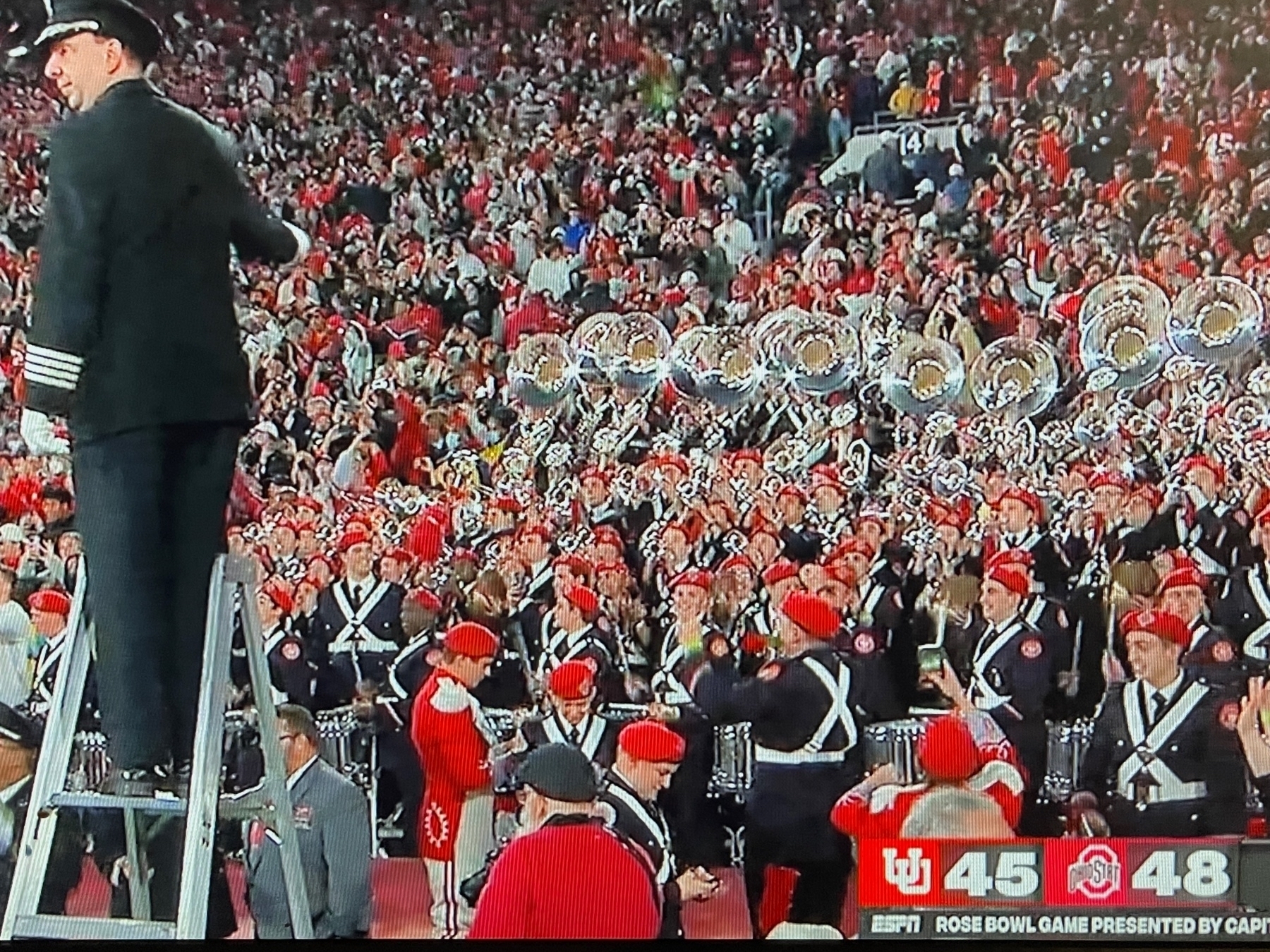
Happy New Year, folks.